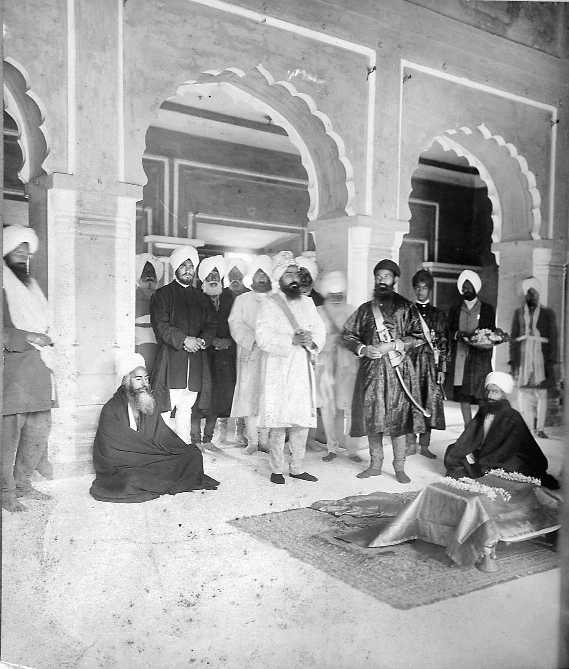
Unsung hero: Sant Attar Singh (seated on the left) and Bhai Sahib Arjan Singh Bagrian with young Ardaman Singh and Maharaja Ripudaman Singh before his coronation. Ripudaman Singh took his succession as a matter of right, and not something to be granted by the British Political Agent. Photo Courtesy: Sikh Heritage:Ethos and Relics
Roopinder Singh
He had a distinct personality and education. He was true to his heritage and helped steer an important legislation for the Sikhs and helped nationalists. An able ruler who introduced many reforms, he laid stress on education and health, all the while fencing with the British colonial authorities who eventually deposed him. Of all the people, Maharaja Ripudaman Singh of Nabha should not have suffered the ignominy of being forgotten by history.
Yet it happened. Now, scholarship has resurrected his multifaceted personality and presented his place in history in this richly referenced volume.
During the British Raj, like many such states, Nabha had a mixed legacy of “absolute autonomy, willing acceptance of political subordination to the British, defiance of the British authorities, feeble resistance to encroachments, and dignified insistence on their own rights.”
Tikka Ripudaman Singh was educated by personal tutors like Bhai Kahan Singh and Lala Bishan Das. He had not made the journey to Chiefs' College, Lahore, like others did. Along with English education, he received traditional training that laid a strong foundation and shaped his actions. He grew up to be a “devout Sikh, a keen social reformer and a staunch nationalist.” He defied his father, Raja Hira Singh, and succeeded in having idols removed from the parikarma of Darbar Sahib in Amritsar.
As heir apparent, his notable contribution was in steering the Sikh Marriage Act through the Viceroy's Legislative Council which he introduced on October 30, 1908. However, his term was not renewed and he was unhappy with the dilution of the Act into Anand Marriage Act. He, however, left a mark during his tenure in the council and fought for recognition of his work, which came after a prolonged effort, when he was vindicated in the House of Commons.
The Tikka had also raised other political and social issues. His conduct in the council led to assessment by Lord Minto that he would be “a troublesome ruler”.
This could be seen right from the time of his accession. Ripudaman Singh took his succession as a matter of right, and not something to be granted by the British Political Agent. On January 24, 1912, his dastar bandi was performed by Bhai Arjan Singh Bagrain in a darbar held with due ceremony. He delayed the British-sponsored installation ceremony for as long as he could, insisting on his own interpretation of procedures. His running battle with the local British administrators, including the Governor of Punjab, Michael O’Dyer, left many scars on both sides — something that would eventually cost the Maharaja dear.
Nabha’s contribution to the war effort of the British was the lowest among Indian princes. In administration, Ripudaman Singh consolidated the good work done by his father, who had laid a solid foundation. He introduced free primary education in the state in 1913; increased the budget of hospitals and dispensaries; and introduced electricity in Nabha in 1915. In 1918, he established a Legislative Council in Nabha, the first of its kind in North India, which introduced a certain degree of democratic governance.
Nabha’s relations with Patiala were strained, with the British political agents playing their role to further estrange the collaterals. Ripudaman Singh sympathised with political movements inimical to the colonial power. He was supportive of the Ghadar movement, as also Bhai Randhir Singh, son of Natha Singh, an Assistant Legal Remembrancer in Nabha. The Maharaja’s support to Sikh causes earned him respect of the masses, and the ire of British agents. He donated Rs 2 lakh to the Banaras Hindu University and, in general, behaved in a manner that emphasised the internal sovereignty of the princely states.
Then, the British stuck. The old rivalry between Patiala and Nabha was stroked, and then a case made about misgovernance by Ripudaman Singh. His support for the nationalist movements and for the Akalis was cited as reasons. He was forced to abdicate and moved out of Nabha, to Dehradun, on July 8, 1923.
Sikh organisations and the SGPC raised a strong voice against this action and an agitation called the Jaito morcha.
The British worked on the principal leaders to dilute the demands. It took two years, but the policy of divide and rule succeeded. The demands of the Sikh Gurdwara Act and the restoration of the Maharaja were bifurcated successfully by the British. The Gurdwara Bill was passed on July 7, 1925. The issue of the restoration of Maharaja Ripudaman Singh was relegated to the background. He, however, continued to write in newspapers and take potshots at his bête noire, the Maharaja of Patiala. He also endeavoured to shape the education of his son, but his position had weakened considerably.
The Maharaja was taken to Kodaikanal as a state prisoner in February 1928. He was to spend the rest of his life there, separated from his heir. On February 14, 1933, five years after his father had been forcibly removed from Nabha, Maharaja Partap Singh and his mother Maharani Sarojini Devi made a public entry in Nabha. The Maharaja’s era, long in eclipse, was practically over. He was to die on February 14, 1942, alone and unsung. Though not so after this informative historical account, which gives us such a wealth of information on him.



























